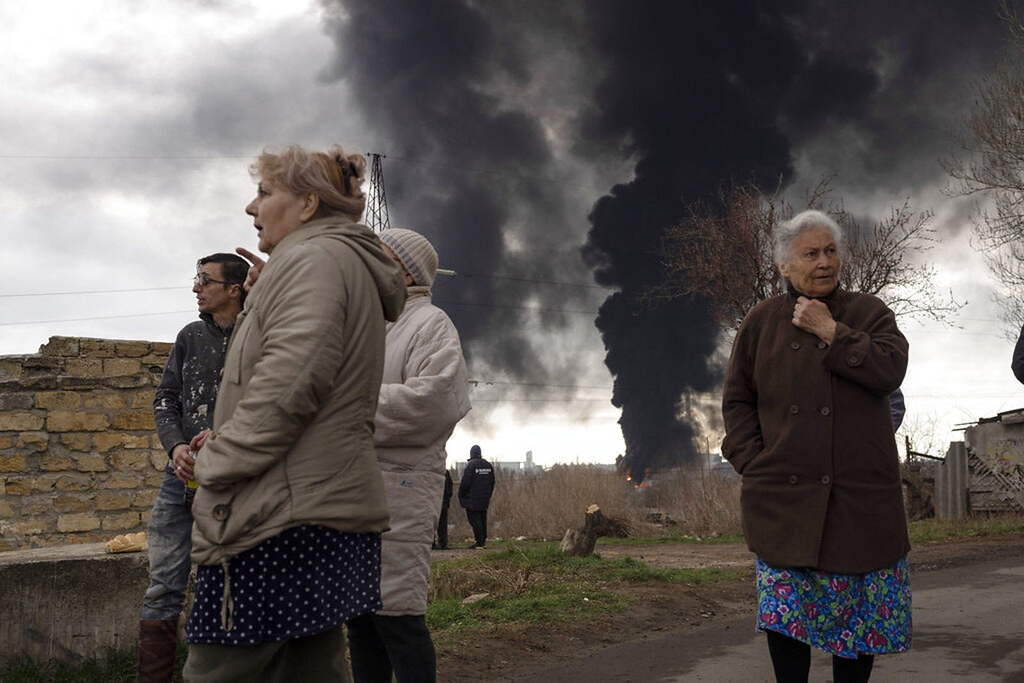
How innocent people suffer on account of wars and how we can avert this tragedy.
Date : 05/06/2025

As I opened the morning newspaper, two strikingly contrasting news articles attracted my attention. One was about the gory details of the Ukranian war. The sheer magnitude of the war and the cruelty of the attack stunned me. As the tragedy unfolded before our eyes, our collective senses were numbed by the shock. It is as if we are getting adjusted to the never-ending images of death and destruction. The human tragedy accompanying the war, and the human interest stories, were even harder to digest. As my nine-year-old son quipped, “Russia attacking Ukraine is like a tenth standard kid beating up a two-year old!”. How true!! My older child, aged 13, more reflective and sombre, was empathetic towards the war-torn children. “How tragic is it to get seperated from your own father!! How sad to see your entire family broken apart!”, he observed. The second story was about the exploration of space. NASA, for the first time, investigated the vacuum-sealed portion of the moon, the news story announced proudly. Not to be left far behind, India’s Chandrayaan -2 captured the images of the hidden side of the moon. NASA has even sent a spaceship into the sun’s orbit. A feat unthinkable of, even a few years ago. A huge leap for the mankind, opening up immense possibilities in scientific advancements. “One small step for man, one giant leap for mankind”, remarked Neil Armstrong when he had set foot on the Moon in 1969. Indeed, human escapades in the outer space mirror the widening frontiers of the human intelligence. Man is achieving the impossible. And the future possibilities are fascinating, well beyond human imagination. Perhaps foreseen only by the prophetic Vanga.
The contrast in the narratives of these two news stories was striking. On the one hand, we have a blatant display of cruelty and insensitivity of the human race. On the other hand, we have the extreme realms of human intelligence, exploring the planetary systems, and beyond. So where are we going? On the one hand, we have increasing capabilities, enabling us to explore the earth and even the space around us. On the other, we have a shrinking human heart refusing to empathise beyond ourselves. Beyond our families, our states, our countries and our races. It is hard to ignore the concomitant cruelty that is taking away lives, hurting innocent civilians, destroying medical facilities, separating families, and inflicting injury. How can we not empathise with the obvious suffering of our very own neighbours? How could we turn a blind eye to the atrocities being meted out? And even while the media is trumpeting the evils of the Ukranian war, it is conveniently oblivious to the raging civil war in the neighbouring Yemen. The civilian causalities in Yemen, spiralling into an unprecedented humanitarian crisis, have not received the kind of attention they deserve. The sheer social cost (girls as young as nine, sold in exchange for a couple of thousand dollars), and human cost (the widespread hunger and poverty) of the war have not attracted international condemnation. Our treatment of these calamities could not have been more contrasting. All this while we celebrate our space explorations, and our scientific innovations and inventions.
So where are we going wrong? There cannot be a bigger contrast than what we see today- the one between the prosperity of human intelligence and the poverty of human heart. Does it make a difference at all that we discover water on Mars? Or of the evidence of life in outer space? Does it really matter that we create inhabitable conditions on the Moon or on Mars? Does it make sense to explore the outer space while we mercilessly deplete the earth’s natural resources?
Why do we not all cultivate tolerance for the fellow human beings? Why can we not stop competing and comparing with our neighbours, friends, siblings, colleagues, spouses and even children? Why do we not explore the root causes of human conflict? Why so we not address the core issue? The contrasting news articles show how humans need spiritualism and not hedonism, now, more than ever. The spiritualist Guru Jiddu Krishnamurthi observed that comparison is violence and the distinction between the self and the other is violence. Pursuit of individual identity as a Hindu, Muslim or Christian, and Indian, American or a Chinese, is violence. Why? Identity brings about competition. And competition invariably culminates in conflict. In his famous address to the United Nations, Krishnamurthy reflected, “Nations can never be united”. Why? The pursuit of nationhood as an identity, fuels differences and hence, violence. What do we see in the Ukraine-Russia war today? A pursuit of identity. Communist and Capitalist. A competition between Russia and NATO. A comparison between the two warring blocs. The same is the case with Yemen. A competition for resources, power, and control of the land, leading to immeasurable cruelty, and tragedy. It would be preposterous to celebrate the achievements of human intelligence if we fail to address our fatal inconsistencies. The inconsistency between the stupendous brain and the cruel heart. As Jiddu Krishnamurthy observed how the world around us, the war and the cruelty, is nothing but the reflection of our own mind, what is within is what you see without. You cannot change the without, before addressing the inconsistencies within. Sri Sadguru Sivananda Murthy, the venerable Guru, agreed. The Guru questioned the purpose of the space explorations without exploring the divinity within oneself. The Guru observed how each one of us is a manifestation of the divine. It is for us to explore the divinity within. Until then, the wars rage on.
Image Credits: Flickr
Tags :
Note: Your email address will not be displayed with the comment.